|

songs | interviews | photos | tours | boots | press releases | timeline
Record Collector (UK)
April 1994
TORI AMOS
Greg Brooks and Robin Evans talk to American singer/songwriter Tori Amos and unravel a recording history that dates back to 1980
Tori Amos arrived on the British music scene in the early 90s as a fully-formed talent, who quickly escaped tired comparisons with Kate Bush and moved from cult status to mainstream acceptance almost overnight. Shortly after her debut album, "Little Earthquakes", was released, the music press 'uncovered' a 1988 hard-rock effort by a band punningly titled 'Y Kant Tori Read' -- and announced in shocked tones that the scantily-clad cover star was none other than Ms Amos.
If they'd dug a little deeper, the same magazines could have discovered that the Tori Amos story began well before 1988.
Tori's earliest recording project, in fact, preceded the YKTR album by eight years. In 1980, under her real name of Ellen Amos, she released an extremely collectable 7" single, "Baltimore"/"Walking With You". Not surprisingly, that's the rarest and most sought after item of the entire Tori Amos catalogue -- which, as we shall discover, is surprisingly large.
PRODIGY
The daughter of a methodist minister and his part-Cherokee wife, Myra Ellen Amos was born on 22nd August 1963, the youngest of three children. Ellen (as she was known) began playing piano at the tender age of two-and-a-half, and entered Peabody Institute as a five-year-old prodigy. After six years' study, however, Amos was unceremoniously kicked out for playing by ear, and preferring John Lennon and Jim Morrison songs to the choices of her teachers. "I was playing the scores of Gershwin and Rodgers & Hart," she says, "and suddenly they're trying to teach me to read music by playing 'Hot Cross Buns.' I was bored out of my mind. Getting kicked out of the conservatory was so traumatic for me, it was like a bad relationship ending. At eleven, it seemed like my life was over."
After failing an audition to re-enter the Institute at 13, Tori began playing live in clubs and gay bars across Washington D.C. and Baltimore. These shows continued throughout her high school years, and eventually she graduated to piano lounges. She also began to perform her own material, having penned her first song ("More Than Just a Friend") at the age of 11.
She was around 17 when she recorded that first single, on the MEA (her initials) label. "Baltimore" was co-written with her brother Mike as a theme song for the Orioles, Baltimore's baseball team. Very few copies can ever have ventured beyond the city limits -- hence today's £100 price tag.
THE WAY SHE PERFORMS
"The energy's got to go somewhere -- it gets caught up in your hips. You feel the spirit of the piano running through you. As women, we've been taught to deny our sexuality, and I think that's one of our biggest crimes. This is bringing together the physical, emotional and spiritual. I feel I act as a channel for these forces."
REPORTOIRE
Tori's early repertoire encompassed literally hundreds of songs, even Led Zeppelin numbers like "Black Dog" and "Whole Lotta Love", disguised to avoid too many raised eyebrows. One moment she'd be playing a Gershwin standard, then a ballad like "Feelings", before segueing into "Killing Me Softly with His Song", U2's "New Years Day", or one of her own songs like "A Married Man". Some of her favourite covers have reappeared recently in Tori's set (John Lennon's "Imagine" and Bill Withers' "Ain't No Sunshine") or were issued as bonus tracks on singles (the Stones' "Angie", Joni Mitchell's "A Case of You", and Billie Holliday's "Strange Fruit").
Anyone who saw Tori performs in thos early days would have noticed her extremely unorthodox piano posture, a precarious straddle-legged pose which appears both provocative and confrontational.
Tori explains: "The energy's got to go somewhere -- it gets caught up in your hips. You feel the spirit of the piano running through you. As women, we've been taught to deny our sexuality, and I think that's one of our biggest crimes. This is bringing together the physical, emotional and spiritual. I feel I act as a channel for these forces."
It was during this period that Amos chose the name by which we now know her. An Atlantic press release about Y Kant Tori Read (YKTR) advised that Tori took her name from the word "notorious", based on the days she spent conducting her father's church choir while wearing red leather trousers. Later articles claim her name was taken from a type of tree. But the facts are rather less extraordinary: a friend's boyfriend once remarked that she didn't look much like an Ellen, but more like a Tori.
Throughout her teenage years, Tori frequently recorded demo tapes which were circulated to record companies. Rejection letters were the usual response, although her work did attract the attention of Narada Michael Walden, who offered to produce her when he felt she was ready, though no record actually resulted.
This disappointment was overshadowed by the traumatic experience that has had such an effect on her life, after she'd left home and trekked across America to live in Los Angeles. One night a member of the audience persuaded Tori to give him a lift home -- only to pull out a gun and rape her. Much later, Tori tried to purge herself of the experience via the title-track of her first EP, "Me and a Gun" -- a haunting, emotive song which never fails to silence an audience.
The years of rejection and the horrific "Me and a Gun" episode led a very disillusioned Tori into abandoning her natural style and attempting to please the music establishment with a different approach. She eventually secured a contract with Atlantic Records to record with pop-metal band Y Kant Tori Read -- a dubious play on words, dating back to her refusal to read music at the conservatory. "The band was together for about two years. We rehearsed three times a week and only played one gig. That's all we did -- stayed in the rehearsal studio, made a tape, got signed, and split up."
MUSICIANS
Featured on the album were musicians like ex-Mr Mister guitarist Steve Farris, future Cult drummer Matt Sorum (now with Guns N' Roses), Zappa cohort Vinny Coliauta, Peter White (Al Stewart's co-writer), and Kim Bullard (ex-Poco), who also co-write several tracks with Tori.
She was marketed as a hard-edged, scantily clad, rock 'bimbo' -- a cliche which, understandably, she finds offensive. The album was slated by the critics and, like the two singles culled from it, sank without a trace. Her vocal delivery was compared to Pat Benatar -- and in fact the albums producer, Joe Chiccarelli, had worked with Benatar immediately prior to the YKTR project. Between 1988 and 1998, Chiccarelli also produced or co-produced four albums by other artists on which Tori contributed backing vocals.
She can be heard on Al Stewart's Last Days of the Century album (Enigma ENVLP 505); his recent LP, Famous Last Words, contained a track written with Tori, while another collaboration, "Dreaming", was dropped from the final album selection. In June 1989, American comedienne Sandra Bernhard released a live double-LP, Without You I'm Nothing (Enigma ENVLP 528), which included "Little Red Corvette", with Tori on backing vocals.
A month earlier the equally charismatic Stan Ridgeway released his Mosquitos LP, with Tori helping out on three tracks. And the following year, Tori and fellow YKTR members lent their talents to Canadian songstress Ferron's Phantom Center album (unissued here).
Tori's only other known song from this period is the easiest to find and least expensive to obtain, but remains a mystery to most of her U.K. fans! The 1989 movie China O'Brien, a low budget martial-arts affair, featured a song called "Distant Storm" which was credited to "Tess Makes Good", but with Tori's vocal. The video is available at a bargain £5.99; the song arrives about seven minutes in and is relatively free of dialogue.
The failure of Y Kant Tori Read was a turning-point for Tori: "After that trauma I crumbled. I was very confused about why I was doing music. I went to a friend's house and asked to play her piano -- I didn't even own one anymore -- and ended up playing for five hours, just writing on the spot."
This artistic binge evidently planted the seed of her solo debut. "People respond to things that are truthful," she expains, "and they can detect when it comes from the deepest part of you. So I put away the tar and feathers and started writing these songs, which demanded to be written."
Tori soon began to record her new material, which eventually found its way to Atlantic's group co-chairman, Doug Morris. He loved what he heard, but realised that such an eccentric style mightn't fit the tight U.S. radio formats. "We understood enough to understand that we don't understand, so we're going to give it to the English, and if they get it, you go over", was Tori's recollection. Morris then contacted Max Hole (head of East West U.K.) to suggest the two labels join forces on the project and attempt to break Tori first in Britain and then, if that worked, back home in America.
FAVOURITES
Tori moved to London in February 1991, where she played small gigs in and around the capital. She performed a mixture of covers, standards and her own interpretations of rock favourites, but incorporated much of the Earthquakes material. "I started playing a few London clubs like the Mean Fiddler, the Troubadour and the Borderline constantly. I played one-nighters where people couldn't care less."
Singer-songwriter Debbie Cassell remembers seeing her at the songwriters' club, the Orange, that summer: "She was the only acoustic artist there -- everyone else was trying to be Patti Labelle. Tori only did two numbers, but there was an immediate freshness about her material and her stage presence. I met her again at the Mean Fiddler a week or so later, and was struck by the difference between her larger-than-life stage personal, with its hints of American zaniness, and her unassuming, very friendly demeanour off-stage. The Kate Bush comparisons that everyone makes weren't obvious then; but I was disappointed when I heard her first album, as it definitely lacked the atmosphere that she'd generated as a solo performer."
Tori's profile increased as she began to win support slots behind labelmates like Marc Cohn. By the autumn, East West were ready to launch her to the public, and her debut EP, "Me and a Gun", was issued 21st October 1991. Radio 1 picked up on another song, "Silent All These Years", making it 'record of the week'. Originally, the EP was only released on 12" and CD, but the label added 7" and cassette editions after Radio 1 picked up on the record, and reissued the original formats, adding Tori's name to the cover design.
Two months later, East West issued Tori's Little Earthquakes album, to critical acclaim. The cover picture, depicting Tori squashed inside a wooden crate, invited numerous comparisons to a similar concept adopted for the first U.S. Kate Bush album. But it was actually inspired by the Alice in Wonderland tale, as Tori later explained: "We were really into the Alice idea -- the shrunken piano, the big mushrooms. We thought it was quite good fun." The 'we' referred to Tori and Cindy Palmano, the genius behind the compelling "Silent All These Years" promo video.
On January 20th 1992, a second single appeared, to support her U.K. tour. The beautiful "China" was coupled with the non-LP gem "Sugar", whilst the 12" and CD single offered two additional tracks -- "Flying Dutchman" and Tori's variation on the "Humpty Dumpty" nursery rhyme.
LENGTHY
As "China" was rather lengthy for a single, an edited version was circulated to radio stations on both CD and 7".
The second leg of her tour commenced in early April, shortly after the release of her third single, "Winter", which became her first minor hit. This success was aided by an immaculately packaged second CD single which featured striking covers of the Rolling Stones' "Angie", Led Zeppelin's "Thank You" and Nirvana's "Smells Like Teen Spirit". The first CD offered yet another pair of previously unavailable tracks -- "Take to the Sky" and "Sweet Dreams".
The first of those bonus cuts provided the title for Tori's U.K. fanzine (co-founded by Robin Evans, co-author of this article) -- originally christened 'Precious Things' but altered at Tori's own suggestion. All three issues are a must for collectors, as each is crammed with Tori info, facts, figures, discographies, interviews, illustrations and anecdotes.
A remix of "Crucify" was released in the U.S. on 12th May on an EP, with "Winter" and the three cover versions from the U.K. digipak. Meanwhile, a U.K. re-release of "Silent All These Years" was scheduled for 27th May, but shelved in favor "Crucify" released as U.K. single, charting at No. 15, making it her biggest hit so far. Its chart status was boosted by sales of a limited CD featuring four live tracks recorded in Cambridge in April, "Little Earthquakes", "Crucify", "Precious Things" and "Mother" -- a set which also included four prints of Tori's U.K. sleeves (excluding "China" for some curious reason).
The intriguing "Silent All These Years" was re-issued in August 1992 in the U.K., the second CD release adding yet more non-album material. Tori's only other single from Earthquakes was "Precious Things" -- a technically brilliant piece, which culminates in a breathtaking piano/drums finale. Not issued in the U.K., it only reached promo stage in the U.S., as a superb picture disc with four tracks previously unavailable in America.
Proof of Tori's cult status came in the summer of 1992, when she was one of a number of artists invited to record a cover of a British No. 1 hit for NME's 40th anniversary album, Ruby Trax. Her interpretation of "Ring My Bell", a 1979 hit for Anita Ward, was (needless to say) very different to the disco original!
Even more enticing was Tori's interpretation of "Little Drummer Boy" -- recorded live in Baltimore on 12th November 1992, and available on a limited edition (of 10,000) U.S. charity cassette. East West distributed a recordable CD of the track to British radio stations in December 1992, though that's more difficult to find than the promo CD edition issued the following Christmas. The track is simply charming, but is spoilt by infuriating and unnecessary shrieking from the audience.
"Speaking of Christmas and Other Things", a KZON limited charity cassette (1,000 only), is yet another rather enigmatic Tori Amos-related item -- though not essentially a musical one. It contains a cover of Shel Silverstein's story/poem, "Sarah Cynthia Sylvia Stout Would Not Take the Garbage Out", read by Tori, with a sparse musical backing added later -- but not by her.
At about the same time, the soundtrack album from Robin Williams' film Toys reached U.S. record stores. Tori's contribution was singing "The Happy Worker", while an additional sampled version, "Workers", also appears. This album was released in the U.K. three months later, in March 1993.
The first single from the album was "Cornflake Girl", which crashed straight into the U.K. Top 40 at No. 7, and rose to No. 4 a week later. The usual dual CD issues offered non-album material in the form of "Piano Suite" on the first disc, and three exciting cover versions on the second. Tori prefers to call these "tributes" -- "A Case of You" for Joni Mitchell (as featured in numberous 1992 world tour shows), "If 6 Was 9" for Hendrix, and "Strange Fruit" for Billie Holliday.
FUNKY
The first American single was the rather funky "God", promoted with a controversial but beautifully directed video. The four-track CD includes the two part "Piano Suite" and another non-LP cut, "Home on the Range (Cherokee Version)", a variation on the traditional song with extra lyrics.
Under the Pink was released on the last day of January in the U.K. and the next day in America, and stormed into the U.K. charts at No. 1. It was the perfect prelude for Tori's planned 250-date world tour, which bagan in Britain on February 24th.
Eleven days later, "Pretty Good Year" was issued as her next U.K. single, backed with the non-LP "Honey" -- surprising those who'd assumed that "God" was the obvious choice. "Home on the Range (Cherokee Edition)" was included on the second CD release, together with two new tracks, "Daisy Dead Petals" and "Black Swan".
Tori's appeal to her fans is undeniable. She sings with an honesty and passion which most of her contemporaries can only dream of. Singing songs about taboo topics like rape, masturbation, sex, religion and guilt, sprinkled liberally with the words "I" and "me" rather than "her" and "she", displays a courage and openness which most of us dare not even share with our partners or closest friends.
Our sincere thanks to Kamran Raja at Spellbound Records for valuation guidance. For "TAKE TO THE SKY" Fanzine details write to: Steve Jenkins, 25 Rydall Drive, Bexleyheath, Kent, DA7 5EF.
MISCELLANEOUS AMOS
PROMOS: There's a French boxes set consisting of a regular Little Earthquakes CD (German pressing), housed in a wooden box with a metal "TORI AMOS" name plate on the front. Also watch out for the unofficial repackaging of Earthquakes and the reissued "Silent All These Years" CD single. It is presented in a hinged wooden box with a beautiful carving of Tori's face on the lid, and was a numbered limited edition of 250.
Tori's world tour quickly fell victim to the dreaded practice of bootlegging. One legitimate rarity from the tour, however, is a promo cassette titles "Australia Tour Souvenir" which includes studio versions of "Teen Spirit" and "Angie" with the four live tracks from the U.K. "Crucify" box.
MEMORABILIA: Posters, shop displays, sheet music, fanzines and press kits are fast becoming as popular with collectors as the rarest discs. The YKTR press kit sells for around £80-£100, and a promotional U.K. numbered print of the "Me and a Gun" sleeve, signed by Tori, fetches around £50.
original article
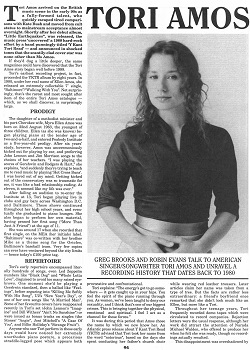 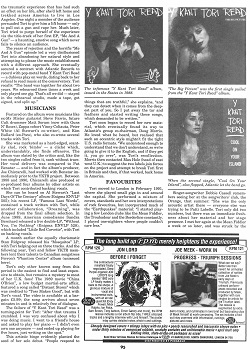
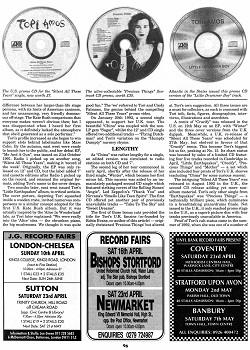 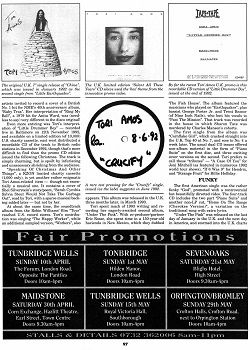
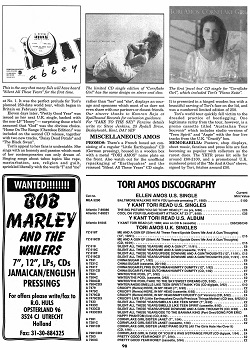 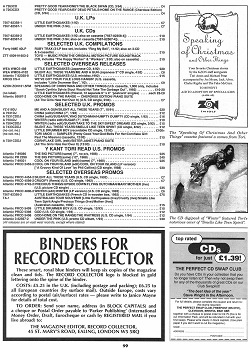
[scans by Richard Handal]
t o r i p h o r i a
tori amos digital archive
yessaid.com
|